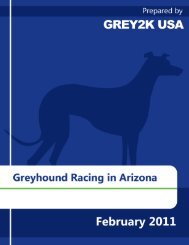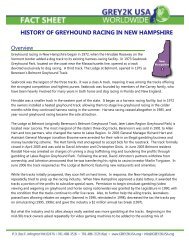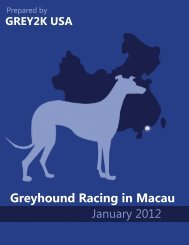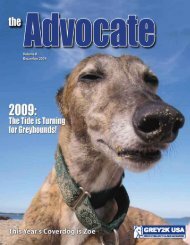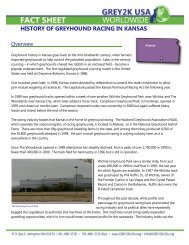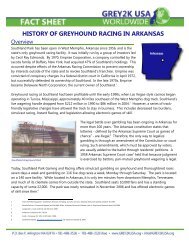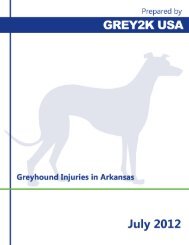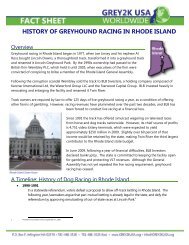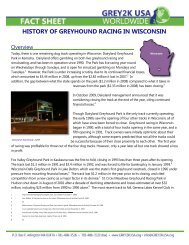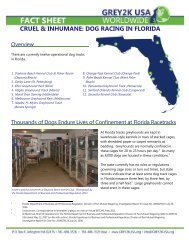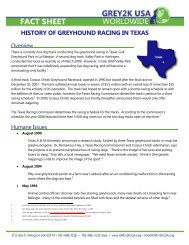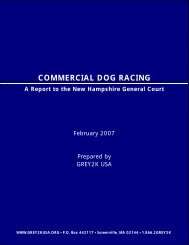HISTORY OF GREYHOUND RACING IN OREGON - Grey2K USA
HISTORY OF GREYHOUND RACING IN OREGON - Grey2K USA
HISTORY OF GREYHOUND RACING IN OREGON - Grey2K USA
- No tags were found...
Create successful ePaper yourself
Turn your PDF publications into a flip-book with our unique Google optimized e-Paper software.
<strong>HISTORY</strong> <strong>OF</strong> <strong>GREYHOUND</strong> <strong>RAC<strong>IN</strong>G</strong> <strong>IN</strong> <strong>OREGON</strong>OverviewGreyhound racing in Oregon began in 1933, when the Legislature passed a bill topermit pari-mutuel wagering in the state. A group of principals from the BelmontGreyhound Track in California formed the Multnomah Kennel Club and opened theirfirst racing season in May 1933 at Multnomah Stadium, now known locally as CivicStadium.In 1952 a voter referendum to abolish pari-mutuel wagering was rejected by a 2-1 margin. Seasonal racing at thestadium continued until 1956, when the greyhounds were moved to the Portland Meadows horse track. Thefollowing year they were moved again to the Murray Kemp Greyhound Park, newly constructed on a 124-acre site inthe eastern suburbs of Portland, in a section of Fairview that would later become Wood Village. Greyhound racescontinued to be held every summer at the track, which was renamed Multnomah Greyhound Park in 1991.In that year, with an eye to increasing revenues from the existing state lottery, the Legislature passed a billauthorizing state-run video poker and keno machines to be installed at restaurants, bars and taverns. Racetrackswere excluded, except for bars and taverns located at the tracks. The new law also opened the door for Indiancasinos, five of which opened in the 1990s.In 1991-92, R.D. Hubbard, owner of Hollywood Park in California, Churchill Downs in Kentucky and other racetracks,purchased a controlling interest in Multnomah Greyhound Park. In 1998 Hubbard sold operating rights ofMultnomah Greyhound Park to Arthur McFadden, owner of a Portland off-track betting parlor and former generalmanager of the Portland Meadows horse track. In 2001 McFadden sold the rights to the Magna EntertainmentGroup, owned by Canadian auto-parts billionaire Frank Stronach. McFadden retained ownership of the land. Magnaalso bought operating rights to the Portland Meadows horse track, bringing both racing enterprises under the samemanagement.Historically, horse-racing and dog-racing interests in Oregon were often bitter rivals. Greyhounds raced in thesummer months, horses from fall through spring. (Summer horse-racing is also held at the Oregon State Fair.) Sincethe exact length of the season for each track was determined annually by the Oregon Racing Commission, and sincea few weeks more or less could mean many thousands of dollars, competition between the “dogmen” and the“horsemen” was keen. In 2003, in a rare example of cooperation, the tracks and their allies in the Legislatureintroduced a bill that would have allowed the seasons of Multnomah Greyhound Park and Portland Meadows tooverlap. If the bill had passed as originally written, greyhound races could have continued throughout the year.Through the efforts of Oregon Defenders of Greyhounds, GREY2K <strong>USA</strong> and other concerned organizations, the billwas amended to limit greyhound racing to no more than seven months per year. It was passed in that form.
In 1997 the state legislature approved a law that made Oregon the “HUB” of an electronically linked betting system,allowing bettors across the country to wager on live races via telephone or theInternet. This has helped to artificially prolong the life of an industry that was otherwise in sharp decline, while givingOregon a pivotal role in interstate gambling.Except for R.D. Hubbard Enterprises, the main headquarters of all of the owners of Multnomah Greyhound Park werelocated outside the state of Oregon, and the greater part of the income from the track flowed out of the state. Thisdid not prevent lawmakers, however, from giving the track multiple tax cuts, subsidies, and other forms of legislativeassistance. Between 1991 and 2002, the effective pari-mutuel tax rate on greyhound racing was reduced from 5.45percent to 1.08 percent. Other than a state license fee of $100 per racing day, Multnomah was exempt from all feesand taxes. In addition, greyhound breeders and trainers received tax breaks from having their facilities classified as“farm use zones.”Throughout the 1990s attendance and wagering at Multnomah continued to decline. Finally, in December 2004, theofficers of Magna Entertainment announced that they were closing the track in order to focus their attention on thePortland Meadows horse- racing track.Greyhound racing in Oregon is over.Capsule History, 1987-2004 November 1987At age 54, Multnomah Kennel Club enjoys its best season ever. The track has a record attendance of611,430 and a record handle (total amount wagered) of $55.67 million. Per-capita betting was $91, anincrease of 3 percent over 1986. “We're the No. 1 spectator sport in the state,” crows MKC president andCEO George Dewey. 1 May 1988The Multnomah track has installed major improvements, including an inside lure, a new track surface andlayout, new lighting, a newly-paved concourse with 300 additional seats, new non-smoking areas andnew kennels. Wednesday matinees have been added to the schedule. Patrons will be able to wager bysimulcast on horse-racing's Triple Crown. 2 August 1988Euphoria continues as Multnomah Kennel Club vice president Mike Dorough predicts that this season'shandle and attendance figures will break last year's record. 3Oregonian, November 5, 1987Oregonian, May 5, 1988Oregonian, August 2, 19881232
Spring 1999State Representative Jo Ann Bowman introduces House Bill 3175, which would require the Oregon RacingCommission to adopt rules governing the breeding of racing greyhounds and to inspect each greyhoundfarm once a year and file a report. The bill is defeated. 23 February 1999Senate Bill 228, introduced at the behest the Oregon Racing Commission, would have allowed greyhoundracing at the Oregon State Fair. It dies in committee after testimony from animal rights advocates. 24 April 30, 1999Multnomah Greyhound Park begins its 66th racing season. Opening night attendance is down 15.9percent from the previous year. On May 1, forty animal rights protesters picket the track. 25 Summer 1999SB 229, a bill that would remove the statutory limit on off-track betting sites, is narrowly passed in bothhouses. After a vigorous letter-writing and telephone campaign organized by animal rights groups,Governor Kitzhaber vetoes the bill on July 19. 26 October 1999Multnomah closes its 67th season. Although betting on simulcast horse races increased this year overlast year, wagering on live greyhound races fell by 11.6 percent.On October 15, sixty protesters hold a rally at the gates. 27 May 5, 2000On opening night at the Multnomah track, thirty demonstrators hold a candlelight vigil in memory of thesix greyhounds who died of heat exhaustion in Ronald Floyd's rental truck and trailer. 28 (See HumaneIssues, below) 2001Oregon Defenders of Greyhounds and their allies introduce a bill in the House to ban greyhound racing,but Rep. Jeff Kropf, chairman of the House Agriculture and Forestry Committee, refuses to allow it ahearing. He claims that debating the bill would adversely affect ongoing negotiations on the sale ofMultnomah Greyhound Park. “The ultimate goal of that purchase,” he claims, “is to develop that land anddo away with dog racing.” Connie Theil of Oregon Defenders of Greyhounds says, “We hear that storyyear after year. Meanwhile, dogs are dying.”2370th Oregon Legislative Assembly, online record, http://www.leg.state.or.us/99reg/measures/hb3100.dir/hb3175.int.html; GREY2K <strong>USA</strong>24Interview, Connie Theil of Oregon Defenders of Greyhounds25Greyhound Network News, Summer 199926Greyhound Network News, Spring and Fall 1999; Interview, Connie Theil of Oregon Defenders of Greyhounds27Greyhound Network News, Winter 1999-2000; People for Animal Rights Newsletter, Fall/Winter 1998-9928 Greyhound Network News, Summer 2000; Oregon Defenders of Greyhounds Newsletter, August 27, 20017
February 2004Magna Entertainment Corp. announces a write-down (a downward adjustment in the accounting of anasset) of about $82 million for the fourth quarter of 2003. The write-down applies to seven of Magna'seleven thoroughbred tracks, including Portland Meadows, as well as to Multnomah Greyhound Park.Both Oregon facilities suffered operating losses in the last quarter. 36 December 2004The presiding state judge of the Oregon Racing Commission has fined Jeff Grady, general manager ofMultnomah Greyhound Park and Portland Meadows, and operations manager Patrick Kerrison $1,000each for asking a Multnomah employee to place bets at the track under a false name. The employee,Kevin Ciula, was fined $1,100 and suspended for six months. The Racing Commission later reduced hissuspension to three weeks and placed him on six months' probation. The fine was unchanged.Ciula placed bets at a high-rollers' club where members must wager $8,000-$10,000 a month. He bet on41 greyhound races during the season, sometimes enlisting other employees to bet for him. On one dayalone – July 7 – he won $21,649 in his wife's name.In a separate incident, track announcer Eric Anderson was suspended and fined $500 for betting while onduty.Ciula said that Multnomah's hub wagering supervisor, Steve Roden, was aware of his illegal wagers.Roden resigned early in December and subsequently was unavailable for comment. Grady left hisposition on October 1 and moved to Pennsylvania. Kerrison is now director of publicity at PortlandMeadows. Both men denied committing any impropriety; Kerrison claimed that encouraging employeesto bet under false names was common practice in Pennsylvania, where he had previously worked. 37 December 2004Citing increased competition from the lottery, Indian casinos and online betting, officials at MagnaEntertainment say they may not renew their lease to operate the track when it expires at the end of thismonth. The Oregon Greyhound Breeders Association has advised its members to cut back on breedinguntil Magna makes its decision. 38 December 2004Racing advocate Roger Newell has asked the governor and attorney general to appoint a task force toinvestigate the regulation and enforcement of the new Oregon account-wagering HUB system. Inparticular, Newell points out that the Portland-based account wagering firm AmericaTab recently pooledhundreds of wagers and placed them on two horse races to win a total of $412,777.80. The bets wereplaced in the name of one individual, a company official.36 Oregonian, February 5, 200437 Oregonian, December 9, 2004; Portland Tribune, December 10, 200438 Oregonian, December 16, 20049
The state's account wagering laws define an account holder as an individual 18 years or older;corporations, partnerships and other groups are specifically excluded. But Jodi Hanson, executivedirector of the Oregon Racing Commission, sees nothing illegal in AmericaTab's actions. “Oregon is afriendly state,” she comments. “...We're open-minded and not looking at things in a little box. We're notover-regulated.”Newell disagrees. “There are no gray areas,” he says. “For an account wagering company to beconducting a players' pool is pure havoc.” 39 December 2004Citing increased competition from other forms of wagering, Magna Entertainment, which has runMultnomah Greyhound Park since 2001, announces that it will allow its lease to expire on December 31.Oregon thus becomes the 36th state in the Union to be free of live greyhound racing.The track’s general manager says that the adoption kennel at the track will remain open until all thegreyhounds are placed. 40Humane IssuesRacing InjuriesAnyone who thinks that racing is not painful because “dogs love to run” should consider the following numbers,obtained by Oregon Defenders of Greyhounds under a public records request:During the 27-week season at Multnomah Greyhound Park in 2001, 80 injuries were reported to the OregonRacing Commission, including some multiple injuries to the same dog. Of these, 27 were confirmed brokenbones, including 17 fractures of the right rear hock – the joint that bears the most stress at the turn. Otherinjuries included 1 “possible” fracture, 2 “reinjured” fractures, 19 pulled muscles, 16 torn or sprained ligaments, 7lacerations, punctures, bruises or abrasions, 1 dislocated toe, 1 paralysis, and 1 ruptured blood vessel. 41Incidents of Neglect and AbuseGreyhound-racing industry officials like to boast that Oregon owners and trainers take good care of their dogs.The following are some examples that belie that claim: October 1999On October 10 trainer Ronald M. Floyd leaves Multnomah Greyhound Park in a rental truck towing atrailer. Truck and trailer are loaded with sixty-one greyhounds, bound for the Sanford- Orlando KennelClub in Orlando, Florida. Floyd is accompanied by a friend to help with the driving. The friend has no39 Oregonian, December 23, 200440 Press Release, Magna Entertainment Corporation, December 23, 200441 Oregon Defenders of Greyhounds Newsletter, April 22, 200210
“hands on” experience with racing greyhounds. The dogs are closely confined, two or three dogs perhole, in crates and compartments.The trip takes three days, including a one-hour stopover in Oklahoma, where Floyd drops off four dogsand picks up six. The dogs in the vehicles are given mixed milk and water during the stopover but are notfed or turned out. No other water will be offered during the trip.After reaching Florida the vehicles become stuck in traffic in 95-degree heat. Reaching Orlando at about11:00 am, the men begin to unload. One dog is found dying. Floyd and his friend try to revive him byimmersion in cold water, but the dog swiftly dies. Turning their attention again to the vehicles, they findanother dog dead and four more in severe distress. They die within minutes. No veterinarian is available.Following an investigation by the Oregon Racing Commission, Floyd's kennel owner and training licenseare suspended for two years. He is also fined $500 for each of the dead greyhounds and is forbidden toenter off-track betting sites or restricted areas at Multnomah Greyhound Park. He retains his license toown a greyhound farm, however, and is allowed access to the training track at Multnomah. He is alsoallowed to continue transporting greyhounds, for which no license is required.Stephen Walters, chairman of the Oregon Racing Commission, terms the deaths “a freak accident” andsays Floyd is “not a bad guy.” But to Connie Theil, director of Oregon Defenders of Greyhounds, “This isjust the tip of the iceberg. We believe that this was gross negligence, and there is nothing to stop dogtrainers from doing this again.” 42 August 2001A relief veterinarian at Multnomah Greyhound Park voluntarily resigns after a dog collapses during a race.The veterinarian, who is required to be present during races, had left the track to go to the grocerystore. 43 April 2002Ronald Floyd, whose training license was revoked two years ago after six greyhounds died in his care (SeeOctober 1999, above) loses his license to operate a greyhound farm for one year after a dead rabbit isfound on his premises on February 12. A veterinarian determined that the rabbit had been killed by acanine, probably while being used as a live lure. Training with live lures is prohibited by law.Floyd had applied to have his training license reinstated but neglected to enclose the fee. The dead rabbitwas found on the driveway by the person sent to collect the check. A few hours later the Oregon RacingCommission sent an investigator to inspect the farm, but Floyd refused to allow him access to someareas.42 Oregon Racing Commission, Ruling #MG2000001, Dec. 9, 1999; Oregonian, April 10, 2000; Greyhound Network News, Winter 1999-200043 Oregonian, August 17, 200111
One month after the Racing Commission revoked his farm license, a greyhound in Floyd's care was founddead of massive trauma, consistent with an attack by a large dog. Floyd keeps two large dogs loose onhis property. The dead greyhound was a female due to deliver puppies in two weeks.An investigator documented the scene of the death with still photos and the greyhound's injuries with avideo camera, but the images were subsequently destroyed by the Oregon Racing Commission. GREY2K<strong>USA</strong> filed a petition with the Oregon Attorney General asking him to investigate the destruction ofevidence by the Racing Commission. “In destroying documentation of this abuse, the Oregon RacingCommission is serving to protect the very industry it's charged to regulate,” said GREY2K <strong>USA</strong> presidentCarey Theil. In defense of the commission's action, the vice chairman said, “We didn't need any pictures.The complaint was filed by Theil because we've prevented him from posting salacious (sic) pictures ofdead dogs on his web site.”After this third incident of egregious abuse in as many years, the state finally revokes Floyd's license torace, train and board greyhounds. He is also barred from all restricted areas of Oregon racetracks andfrom all off-track betting sites. 44 January 2003Even after his license is revoked, Ronald Floyd is allowed to continue to operate his farm. Eighteengreyhounds shipped from Floyd's farm to an Arizona track in November 2002 come down with distemperand three die. The Arizona Racing Commission orders all 4,000 greyhounds in the state to be vaccinated.At least two greyhounds raised on Floyd's farm died of the disease in Florida in 2002. 45 August 2003 – February 2004On August 11, 2003 kennel owner Harry Marshall Rae leaves the Multnomah track pulling a trailercontaining forty greyhounds. The trailer is not air-conditioned. Rae drives to Cheyenne, Wyoming andthen to Nebraska, dropping off a few dogs at each stop. He continues to his final destination at Carter,Oklahoma.The trip takes thirty-eight hours, including two stationary hours at Carter waiting for help to unload. Thedogs have been caged without relief since leaving Oregon.When Rae finally opens the trailer, he finds one greyhound dead. He tries to save a second by immersionin a water tank, but the dog dies before the tank is filled.Both dogs are buried on the Oklahoma farm. An investigator from the Oregon Racing Commissiontravels to Oklahoma and digs up the bodies, but says he is unable to determine the cause of death.According to state records, the investigator “found nothing that points to negligence on the part of Mr.Rae.” The commission fines Rae a total of $250 and requires him to keep a log on future trips. His licenseis not suspended.44 Oregonian, May 29, June 27 and July 18, 2002; Greyhound Network News, Summer 200245 Oregonian, January 12, 200312
Note: In 1994 the Iowa Racing Commission fined Harry Rae $500 and suspended his license to race forninety days after he failed to provide adequate medical treatment to an injured greyhound. 46 April 2004The Oregon Racing Commission adopts a rule requiring haulers transporting greyhounds in and out ofthe state to keep a trip log. However, the logs need not be turned in directly to the Racing Commission.Instead they are given to the Oregon Greyhound Association, an industry group. This means that theyare not public records: they are in private hands. That maneuver closely resembles the evasive tacticspracticed in 1990 by then Oregon Racing Commission executive director Steve Barham.GREY2K <strong>USA</strong> president Carey Theil comments, “There is a disturbing pattern here. The (ORC) thinks theyare above public record laws. This agency has a history of requiring records to be kept in other locations,which thwarts the law.” 47 (See the first item under September 1990, in Capsule Chronology, above.)46 Oregonian, February 3, 200447 Oregonian, June 2, 2004Last Updated on February 15, 200513



